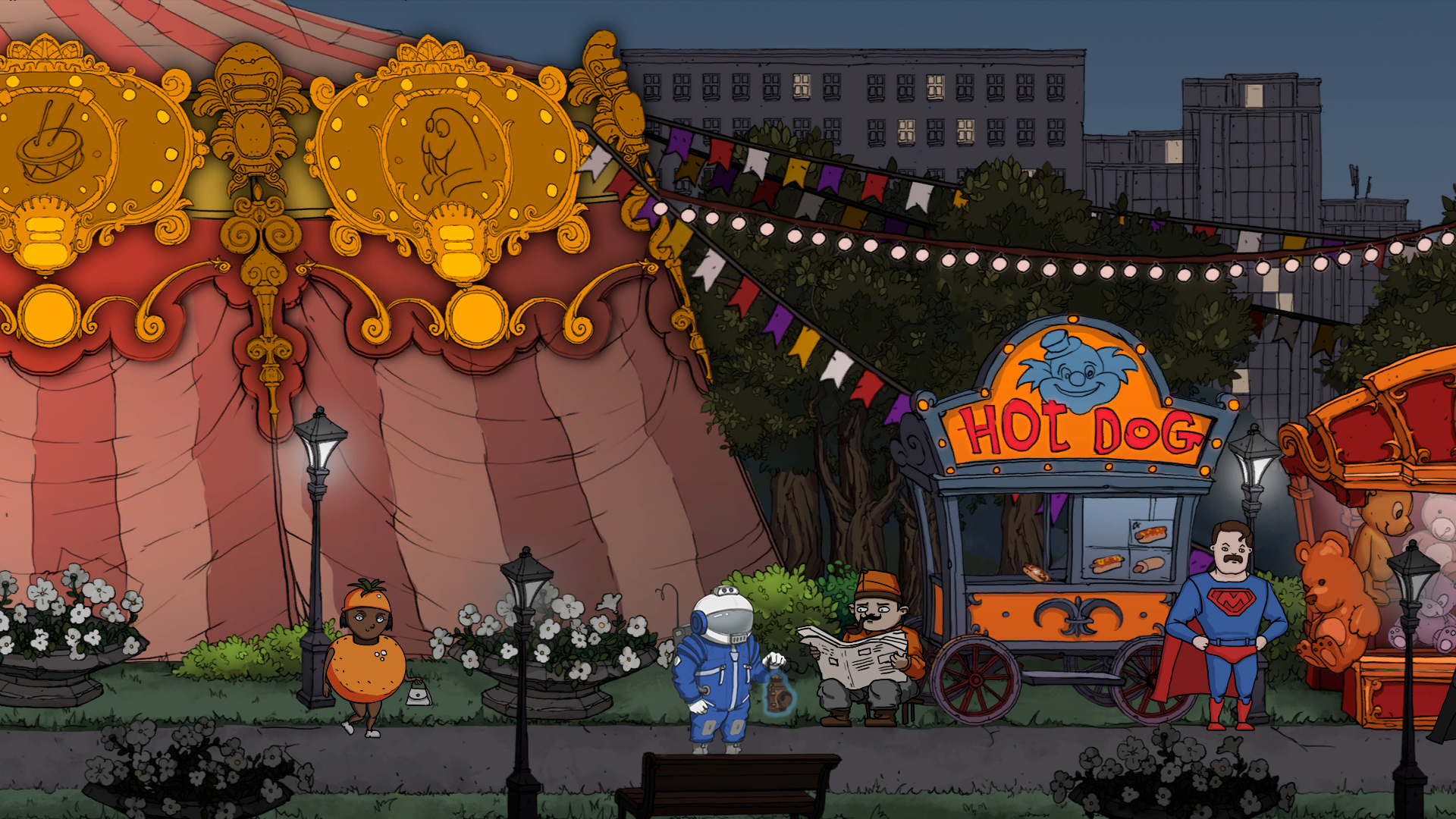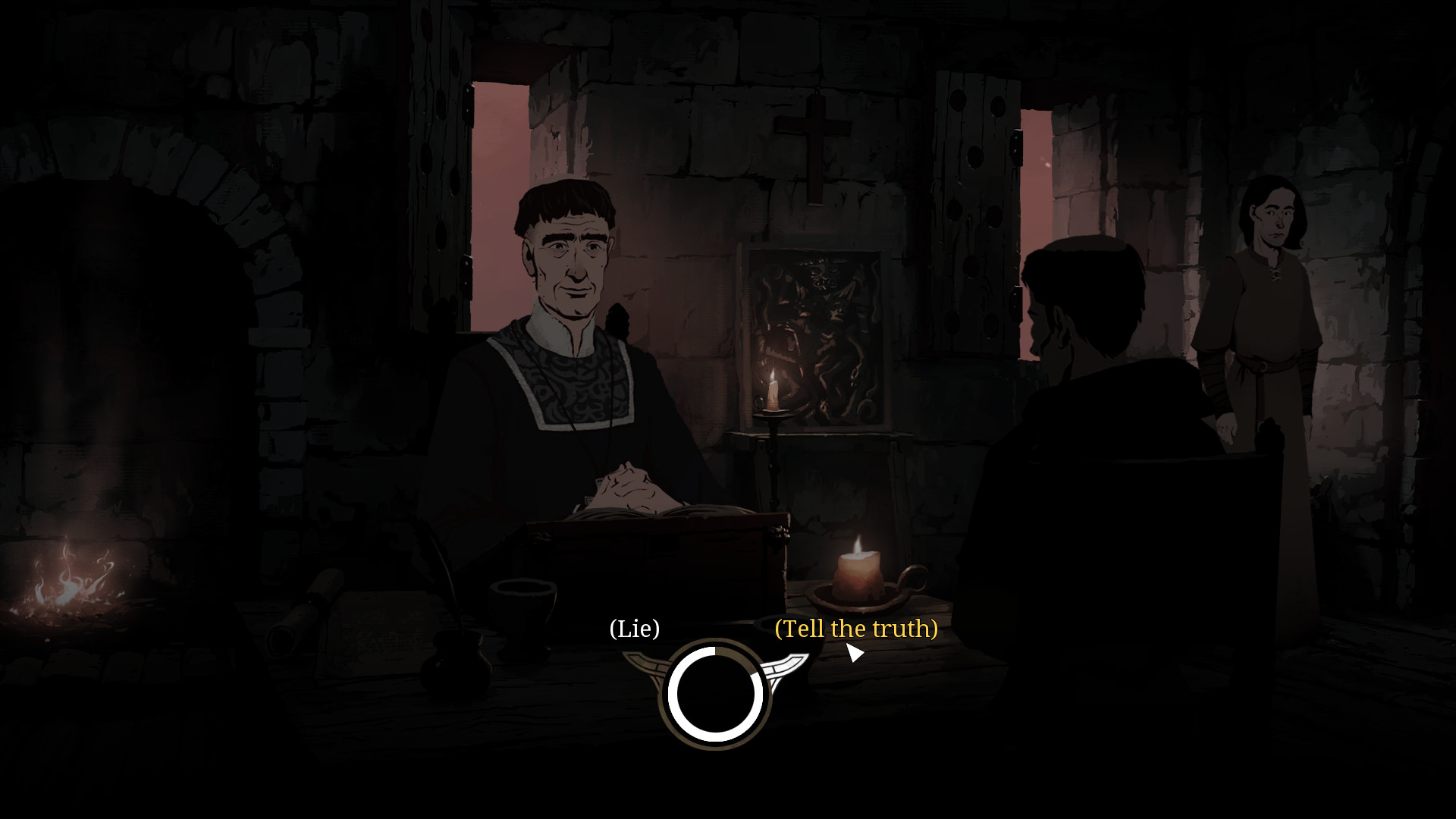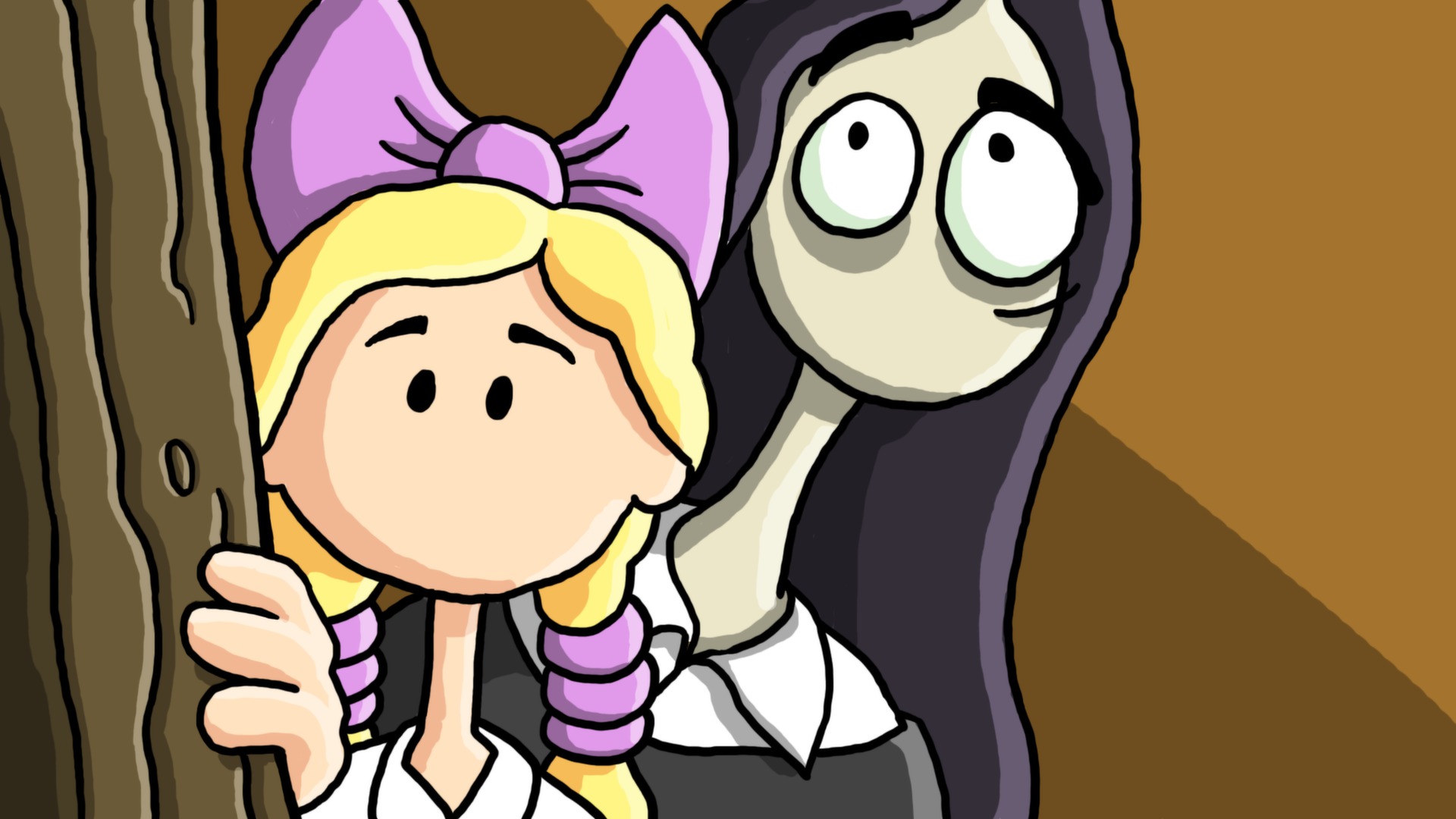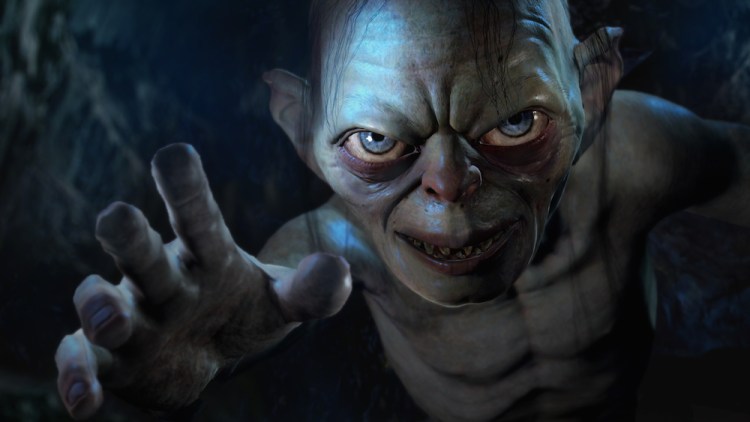Daedalic Entertainment made what I thought was the biggest video game franchise news of last week’s Game Developers Conference 2019 in San Francisco — it’s getting into The Lord of the Rings with an adventure game about Gollum.
The German publisher announced the news this morning. I did an interview with Carsten Fichtelmann, the CEO and cofounder of Daedalic, on Thursday. It started out as a briefing on the news and his company, but we delved deeper into a discussion about the sheer ambition and risk of telling Gollum’s story. Capturing the essence of the character — how he’s driven by his two personalities, both addicted to the obscene power of The One Ring — seems like such an intimidating task, especially in light of the excellent performance Andy Serkis delivered in Peter Jackson’s films (with the help of awesome digital animators and motion-capture specialists).
We talked about the new licensing deal between Daedalic and Middle-earth Enterprises, how the adventure game market has changed, how a studio like Daedalic could take advantage of works such as Black Mirror: Bandersnatch, and the approach the studio is taking with The Lord of the Rings.
Here is an edited transcript of our interview.
June 5th: The AI Audit in NYC
Join us next week in NYC to engage with top executive leaders, delving into strategies for auditing AI models to ensure fairness, optimal performance, and ethical compliance across diverse organizations. Secure your attendance for this exclusive invite-only event.
A new adventure

Above: The Great Perhaps is a time-traveling puzzle game from Daedalic Entertainment.
Carsten Fichtelmann: I founded Daedalic Entertainment in 2007. We were mainly concentrated on producing and publishing storytelling games in the past. “Mainly” means we had also titles in other genres in the past. We’re now 85 people based in Hamburg and Munich. We have 10 people in Munich. We were named several times studio of the year in Germany. When it comes especially to the German community—there are two big award ceremonies in Germany every year, the German Developer Awards and the Computer Game Prize. In those categories, we’re the record holder. We’ve won more awards than any other company in Germany at these two ceremonies, based on games you can find on Steam. We have about 60 games on Steam. Maybe 25 of them are self-developed games, over the course of the last 12 years.
Last year we had games like Ken Follett’s Pillars of the Earth. We had Shadow Tactics. We had four or five titles in the last three years that hit number one on Steam. Normally all these games are also coming out on consoles. We have about 20 games on PS4, on the store.
In the current market situation, there are many more subscription services showing up. It’s quite good when you’re capable of having the right content. … We face maybe the same situation Telltale faced last year, when they went down. The audience for storytelling games is still out there, but the problem is that this audience only likes to watch these kinds of games, which then you make a game that’s meant to be played on PC or console, and the audience maybe only wants to watch it on YouTube or Twitch. For us, we see big numbers of people who only watch our content, but we have no solution to monetize this audience. When we look at the new streaming portals, obviously what we see—Disney is coming to that space, and then you have the subscription services for games. You have new players coming with Google or Microsoft starting services for PC. But something in between, which is interactive storytelling, it doesn’t exist. Telltale already planned something with Netflix, as you know, but they couldn’t finalize that.
This is something where we think we as a company are the go-to guys for everyone, to do something like Black Mirror: Bandersnatch. Not from a filmmaking perspective, but more from a game production perspective. We’re storytellers ourselves. We’re doing interactive storytelling now for more than 10 years. We can do what you call interactive experiences, not with the classic instruments of filmmaking, but with the Unreal engine. This is something where we’re planning for the future. Due to the fact that we’ve released so many storytelling games — we have quite a good international standing when it comes to storytelling — I called, four years ago, the guys from Middle-earth Enterprise in Berkeley, like Peter Jackson did 20 years ago. I said, “I’d like to do games about The Lord of the Rings. After some negotiations over the course of maybe three years, we’ll announce … this is the big thing. We’re doing games based on The Lord of the Rings.
GamesBeat: This is interesting, because I few years ago, I noted how people should bring their licenses to you for storytelling adventure games. And here we are with The Lord of the Rings.
Fichtelmann: This is one of our solutions for facing the storytelling situation. This is our philosophy when we do storytelling games. Are we doing something timeless? When you look into our 2D adventure games, which we put out over the last games — for example, the Deponia series, that feels like a playable Futurama. This universe will have the same freshness 20 years from now. That’s the case with The Lord of the Rings. It’s been around for 60 years. Amazon is planning the most expensive TV series ever.
GamesBeat: Are you doing anything to tie into that Amazon series?
Fichtelmann: At the moment, this is our case: Amazon is doing their series, and then there’s the Athlon MMO. But these are all the things I’m familiar with. Obviously, there are potential collaborations for the future. But we’re concentrating on what we’re doing. Our first game we’re doing is about Gollum. The conflict is always in the main character, in the protagonist. You have the two characters talking to him continuously. From a storytelling perspective, it’s a good starting point to do whatever we want to do.
An ambitious adventure
GamesBeat: I can’t be the first person who’s said it’s unexpected and ambitious to start a licensing partnership with a game about Gollum.

Above: Pillars of the Earth is the adventure game that Daedalic made based on Ken Follett’s novels.
Fichtelmann: Yeah. [Laughs] But doing something ambitious is better than doing something everybody does. When we approached Ken Follett about doing a game based on Pillars of the Earth, which is 1,400 pages, we said, “Yeah, it’s doable. We’ll bring a fresh look at it.” It’s quite niche, but all the experience we’ve had with Pillars of the Earth and the other games we’ve produced, and also action games like The Long Journey Home—I think we’re now capable of this. Everything we’ve done when it comes to storytelling, we already have that in our genetics. Now we can bring an action part to this.
The Lord of the Rings: Gollum will be an action-adventure. All the information we’ll reveal on Monday. The release date is 2021. It’ll be the first game in a series of games. It will be premium. It will come out on all relevant platforms we have in 2021, which means, after the announcement from Google, this is for sure PC and console, but with that technology it seems like you should also be able to play on your iPad or whatever.
GamesBeat: But it won’t be on Netflix.
Fichtelmann: [Laughs] As I said at the start of our conversation, if there’s any chance to have a version which is more or less—more easy to play, or let’s say a story version of an action-adventure game, I think there’s a good chance at seeing it on a portal like Netflix. It depends on what these guys are doing in the future. Having in mind what Black Mirror did with Bandersnatch, I think there’s much more fantasy there, doing interactive things with the medium. This is something I’m very convinced that we will see in the future: new formats between TV series, movies, and games. I personally think that Daedalic is one of the go-to guys when it comes to interactive storytelling. But for now we’re concentrating on two productions internally. One is Gollum and the other is an RTS we’re producing right now.
GamesBeat: The Lord of the Rings has some good games that were made in the last decade. How are you going to beat those?
Fichtelmann: One of the reasons Middle-Earth Enterprises decided to work with us is—you already mentioned, for instance, the Warner games. These are fantastic games. But when it comes to deep storytelling, then I think our approach is a different one. Especially the Tolkien estate, they like to see a company doing something else with the license. This is the reason we finally could secure the license. That means we’re now giving our version of what’s possible with the license. Maybe not a fast, action-paced RPG that we saw in the past.
Now, we’re doing it with a deeper storytelling approach in an action adventure type of game. Imagine Lara Croft or Uncharted without that much fighting. Some of the mechanics are clear — stealth, climbing, tricking other characters. But one thing that’s also quite important for us is to do something that’s unique. You said that this is ambitious, but it’s also unexpected. This is quite important. If we then hopefully create a great experience, then there’s no more need to another Gollum game. Which then means, hopefully the game stands for the next 30 years. You have all the possibilities, which means that we then created something that stays—graphically, it means we don’t go too deep into the uncanny valley. We’ll try to do something that, when it comes to colors and shapes, is something that can stand like The Lion King from Disney, for the next decades.

Above: Warner Bros. has turned in a pair of good Middle-earth games.
GamesBeat: When it comes to doing Gollum, the first thing I think about in adventure games and The Lord of the Rings, do you remember the old–
Fichtelmann: The text adventure games?
GamesBeat: Yeah.
Fichtelmann: Now we’re doing that with graphics.
Intimidating interaction?
GamesBeat: No one’s done anything like that with The Lord of the Rings since then. You’ve made your own franchises, but you’ve never done anything that’s so visible before. Is that a little intimidating?
Fichtelmann: I don’t think so. On the one hand, this is a big chance for us, but I also see, especially when it comes to the two current productions, that there’s a lot of passion in our studio for the RTS [A Year of Rain] and for working on Gollum. I see the passion in the team. When we’ve done storytelling games in the past, we’ve normally had one strong writer, one strong game designer, lead game designer, and then 30 or 40 people who have to follow them. There’s a strong director. Especially for the RTS, team-wise, this is a dream project for people in the studio. They all normally play multiplayer games and very classic point-and-click adventure games. When it comes to Gollum, the best comparisons are the action-adventures you normally see on the consoles.
This is also something where I see that our team is more enthusiastic about these two productions compared to, maybe, some of the games in the past. That doesn’t mean they weren’t enthusiastic enough for these kinds of games, but now these two new endeavors are really cool for our people.
GamesBeat: Gollum is such a unique character when it comes to fantasy literature. There’s no one like him. But there’s also no one like Andy Serkis, who had such an amazing performance as Gollum in Peter Jackson’s films. Is that definitive performance intimidating to you? It stands up so well.
Fichtelmann: We’ll see. Obviously, Andy Serkis did a fantastic job. He’s stuck in some way with the Warner version of The Lord of the Rings. We don’t know if he may then reprise his role in whatever Amazon is doing. We’ll show, at some point in the future, how our Gollum looks. He’s quite well-described in the novels. It will be very near what Tolkien has said Gollum looks like. And then we’ll see. Some people have already asked if we’ll have Andy for the voice-over of our Gollum. We’ll see. Maybe due to the fact that our Gollum doesn’t look totally different from the Gollum we know from the film universe, but it will look a bit different—I don’t know. Maybe it will also be a little bit, for the audience, a bit different to see the same actor then reprising the role with a character that looks different. Maybe the good thing with Gollum is that our Gollum—we don’t retell the Gollum story. It’s already there. But it has so many gaps. You don’t know—there are questions that pop up in the novel. We can fill in all these existing gaps. We’ll tell why Gollum is what he is. I think that’s a big chance. We see him a little bit younger, until he first appears in the novels. We’ll see quite a new perspective on the character.
GamesBeat: Is this game going to start before The Fellowship of the Ring?
Fichtelmann: It takes place in the same timeframe, but Gollum doesn’t show up on the first page of the novel. We’ll tell his story until he first shows up. Sometimes they mention some things that happen to Gollum, but nobody knows exactly what happened. That’s our task, explaining what exactly happened there.
GamesBeat: Are you going into his torture at the hands of Sauron?
Fichtelmann: We had a meeting with Middle-Earth Enterprises on Monday where we already presented them with the game mechanics we’d like to see. One meeting before, we presented the whole story for them. But that’s something I can’t tell you today. Obviously, that’s one of the things that maybe people would like to know, what happened there, what was the relationship between Sauron and Gollum. But it’s not something I can talk about today.
GamesBeat: Whenever I think about Gollum, I think about Gandalf and that quote about how it was pity that stayed Bilbo’s hand.
Frodo: “It’s a pity Bilbo didn’t kill Gollum when he had the chance.”
Gandalf: “Pity? It’s a pity that stayed Bilbo’s hand. Many that live deserve death. Some that die deserve life. Can you give it to them, Frodo? Do not be too eager to deal out death in judgment. Even the very wise cannot see all ends. My heart tells me that Gollum has some part to play in it, for good or evil, before this is over. The pity of Bilbo may rule the fate of many.”
One important aspect of Gollum, in my opinion, is that there’s a pity and an empathy that goes into understanding that character. Is that something you’re trying to capture?
Fichtelmann: Absolutely. As I already said, the conflict of this character, of these two characters within the character talking to the player constantly—you’ll see this conflict in the mechanics. When you play Gollum, you’ll play Sméagol at the same time. You need to make some decisions, maybe some decisions that are more or less from Sméagol, and some that are from Gollum. You can decide for yourself what you’d like to see more. When you decide some things, it could be—this is reflected in the mechanics. The game forces you to convince yourself and find one of these two positions. When it comes to other iconic characters in the universe, in Middle-earth, we’ll see what happens around Gollum.
GamesBeat: When did you first read The Lord of the Rings?
Fichtelmann: Twenty years ago? I’m not that fresh with—I’m not the main author of the game. But interestingly, our main author was also in charge of Blackguards and the Dark Eye games. One of the most important things about working on The Lord of the Rings for Middle-Earth is having a Middle-Earth expert working on the game. We asked, at one of our last meetings—normally this is a hand-picked person. They have five or six people around the globe, and you work with them on writing whatever you do. Our lead author, Tilman Schanen, he’s already presented to Middle-earth about what he’s planning for Gollum. We asked in that meeting who we should work with, who should be our consultant. They said we already had him in Tilman. When it comes especially to questions about the world, I would normally say Tilman is a better person to ask, aside from me.
GamesBeat: What are your feelings on Gollum? How do you feel about the character?
Fichtelmann: As I said, from a storytelling perspective, this is an interesting thing. You have a depth of feeling for that conflict, as you already said, and the relationship between these two characters. We have a big chance to show what perspective the Gollum character has on that. Hopefully, we can go as deep as possible into that. People will different things. They can feel pity for him. They can—I’m sure that everyone hopes that in the end—our game won’t show his end. We know what his end is. But I think that the player then finally hopes, like when you see Titanic—this time, watching it for the 10th time, you still hope that he’ll survive, that love should survive. This is also something that’s key to our game, for Gollum’s fate and Gollum’s journey. It’s clear what will finally happen to him, but on the other hand, it’s really interesting to see the story that happens until what we saw in the novel and saw in the movie.

Above: Edna and Harvey is another Daedalic Entertainment adventure series.
GamesBeat: Has Daedalic ever written a character who had split personalities like this?
Fichtelmann: For the Edna and Harvey series — my cofounder Poki did both of those games. And also in Deponia, you have many characters who have split personalities. But especially Edna, she has the little toy Harvey who’s her conscience and she talks to her. Poki [Daedalic cofounder Jan “Poki” Müller-Michaelis] won’t be involved in Gollum, but as a company we have something like a writers’ room. All of the writers in our company talk about, every four weeks, what they’re doing at the moment. Ben, who’s doing Year of Rain, working on the story for the new RTS—we have one game which we’ll announce later on, which will be next year, so we have five authors. In the past we’ve had as many as eight, when we did more storytelling games, but now we have these five guys. It’s all guys. We have had women in the past. But they’re talking every four to six weeks about what they’re currently doing.
The art of the matter
GamesBeat: There’s a lot of art around the Lord of the Rings. You have cartoons, the Bakshi movies that have their striking style. You have the style of Peter Jackson. But then you also have the style of things like the Tolkien Bestiary book that came out in 1978. Will your visual style take any of those elements, or is it going to be different?
Fichtelmann: It’s too early to tell. On Monday [March 18], we had a discussion with Middle-earth Enterprises. They normally have to greenlight whatever we’re planning. They’ve greenlit everything we presented to them before Monday. On Monday we presented our philosophy for the graphical approach of the game. We’ll see what their answer is. In that meeting, I can say they liked it quite a lot. Now we have to wait for the official response, that they liked it and we can go that way. As I say, the only thing is—it’s definitely a timeless approach. We’ll have our own kind of colors and shapes. We have some—verticals are quite important, because so many things in the world are quite big. We’re looking at everything you mentioned, and fantasy illustrations in general. Peter Jackson incorporated so many The Lord of the Rings book illustrations. He made it difficult for anyone else to mine things like the book illustrations from the ’70s, so we’re looking further back to seek inspiration.
GB: Looking at the companies that have worked on The Lord of the Rings and Middle-earth, you have Warner Bros, a top company in video games. In board games you have Fantasy Flight, a leader there. Looking at Daedalic, having Middle-earth say, greenlight a game with you, what does that say about Daedalic?
Fichtelmann: What’s your view of that? [Laughs]
GamesBeat: From my view, while I’m not 100 percent familiar with your company, I do know you’re the best storytelling adventure game outfit in Europe. To me it elevates you even more, showing that you’re a leader in the game industry.
Fichtelmann: That should be our goal. When we had our conversations with Middle-earth Enterprises and they finally decided, with the Tolkien estate, that we would be a good fit when it comes to storytelling, and when it comes to—really, the company who is doing the next The Lord of the Rings games. Nothing is for sure. But I’m personally convinced that our team is capable of producing a fantastic game, hopefully something that will be a classic in 10 years.


